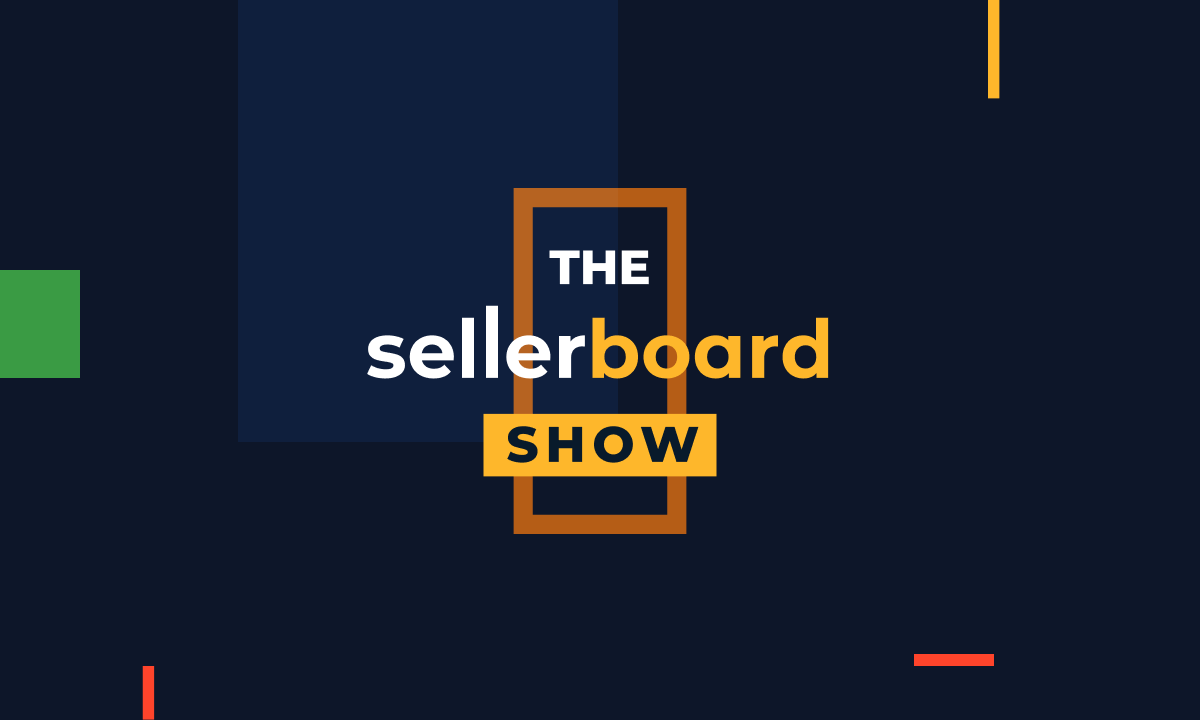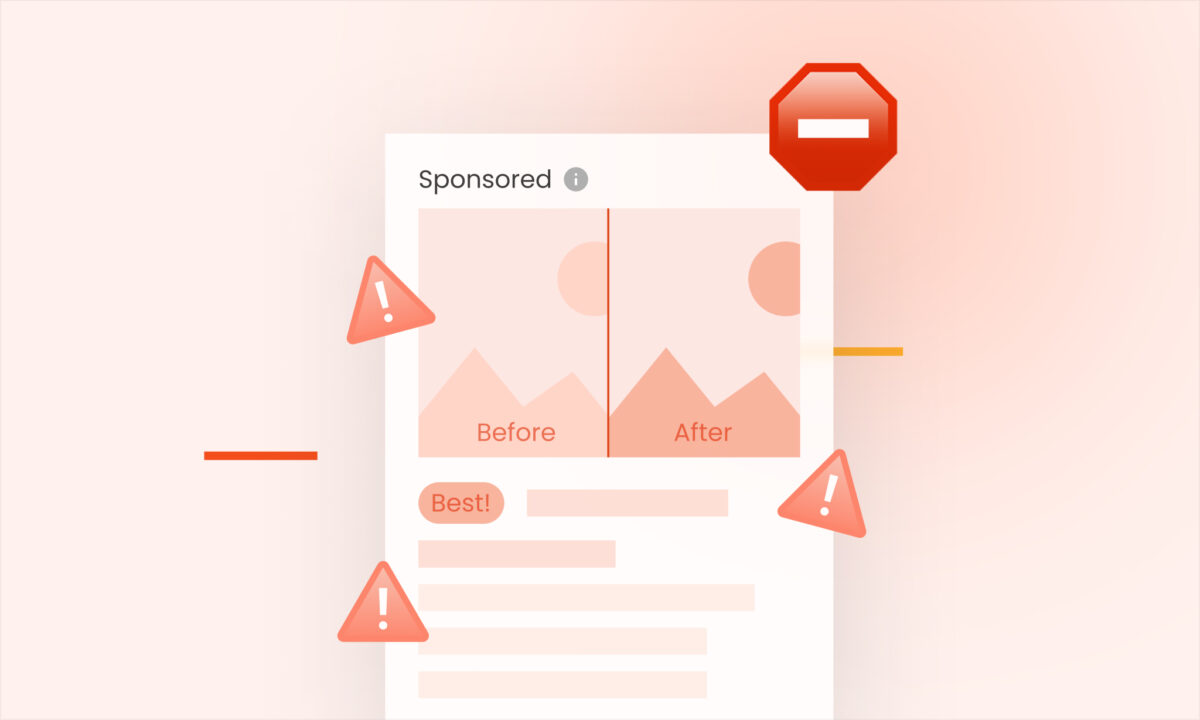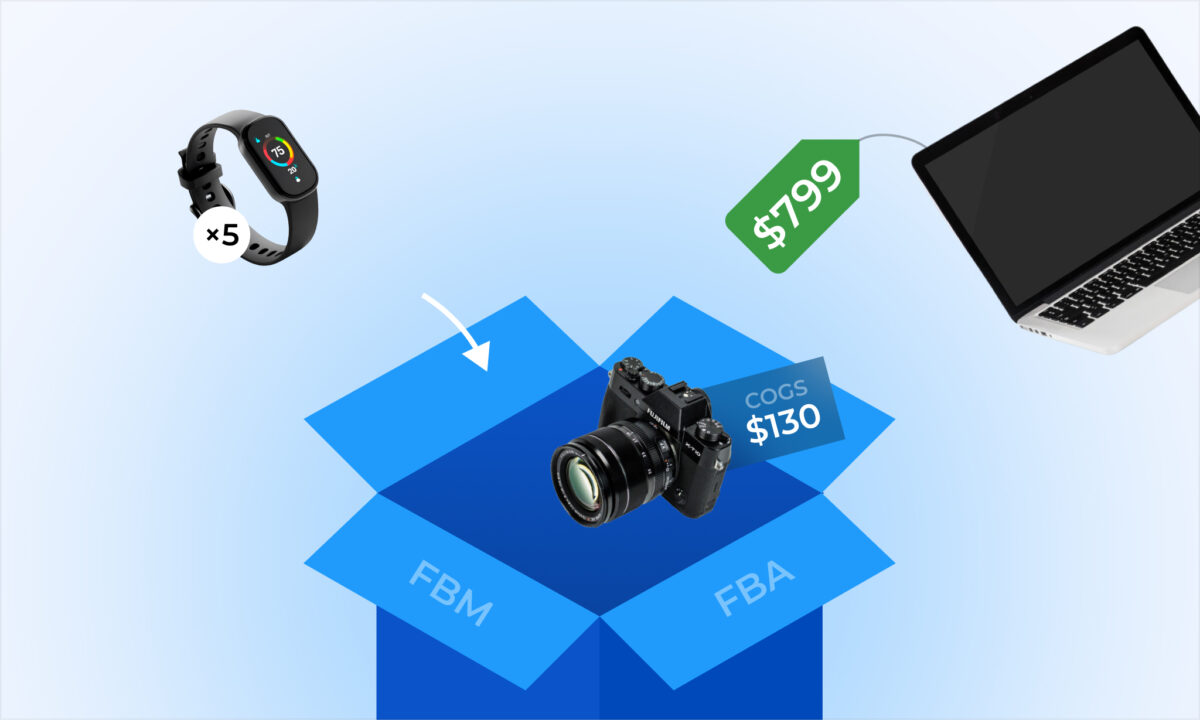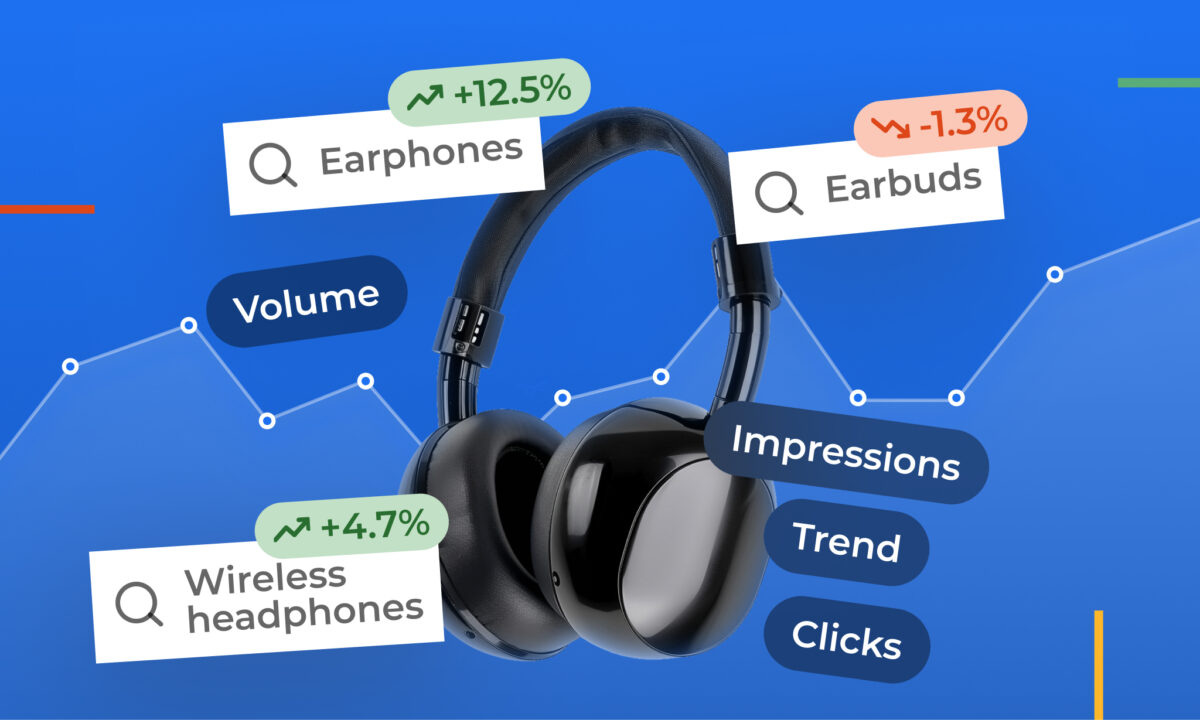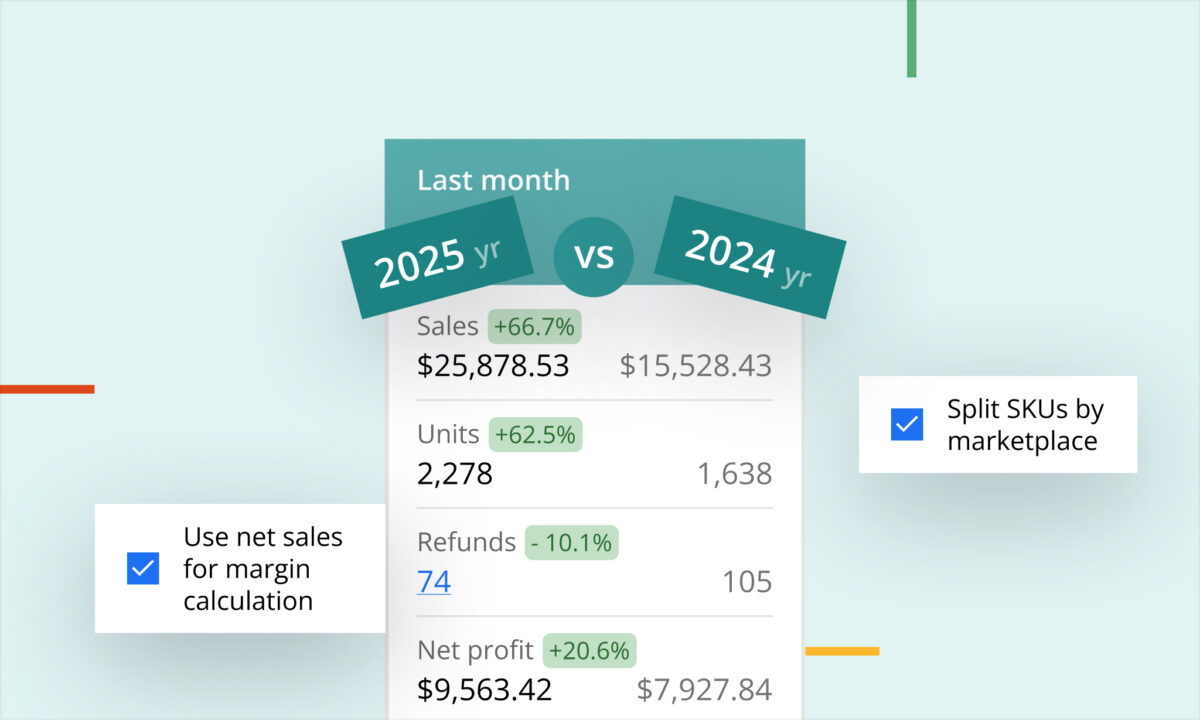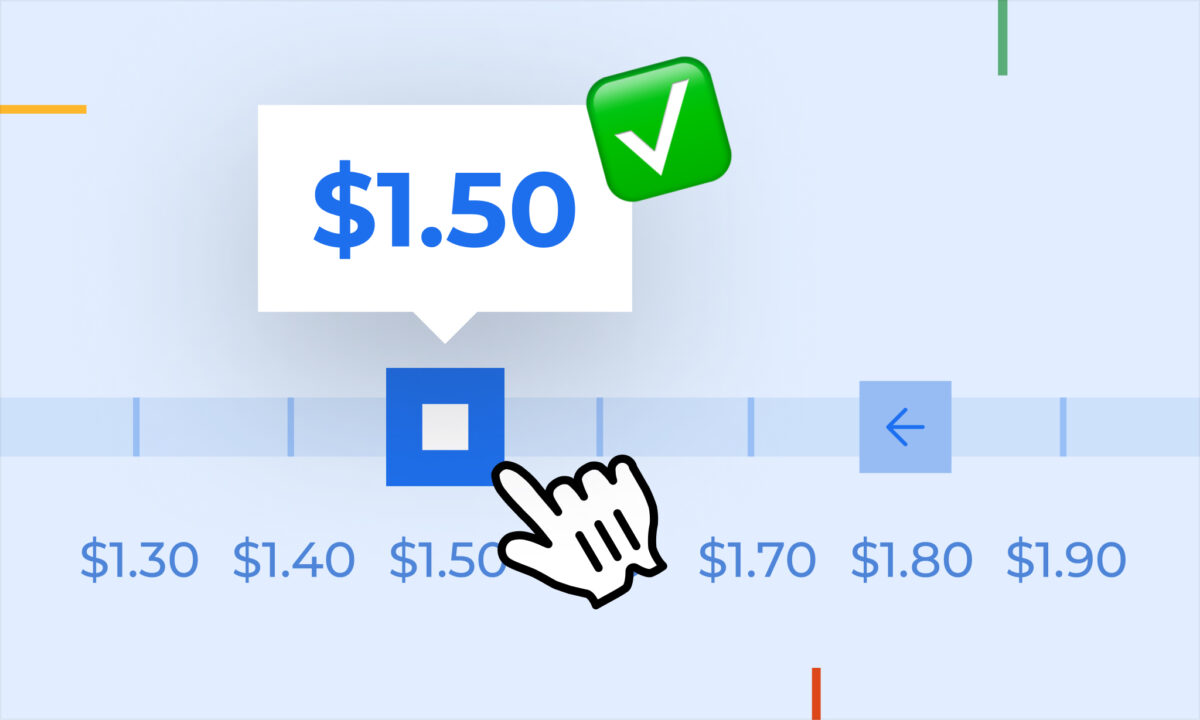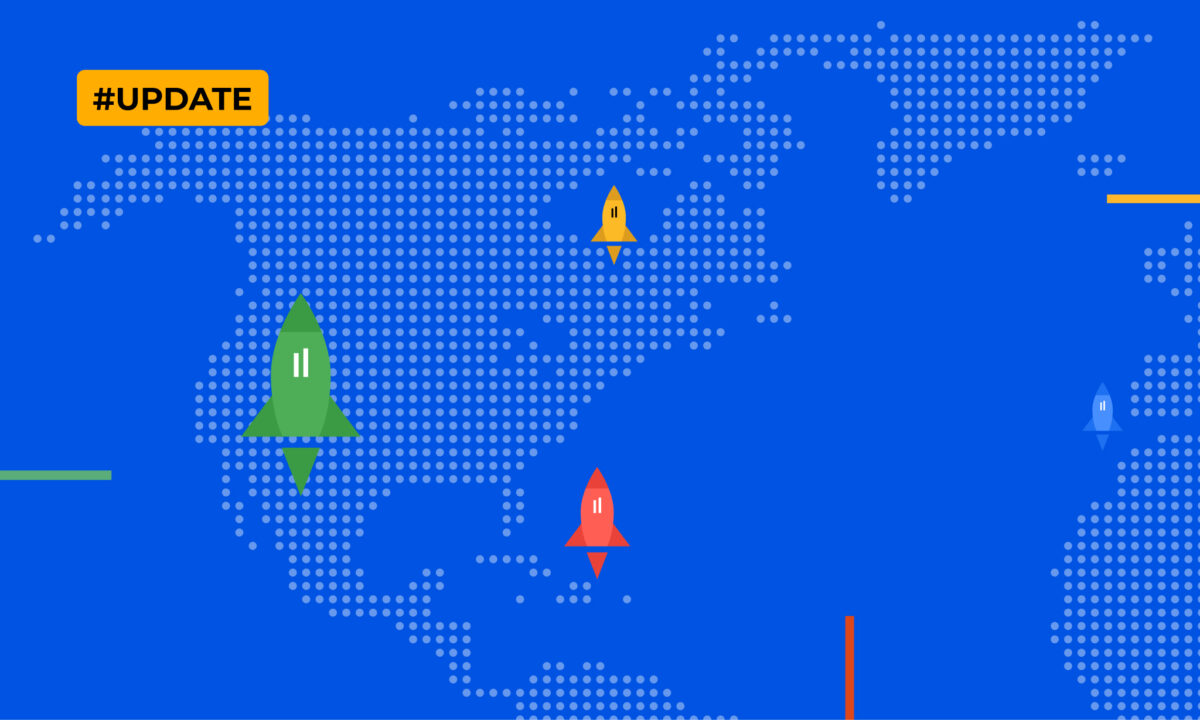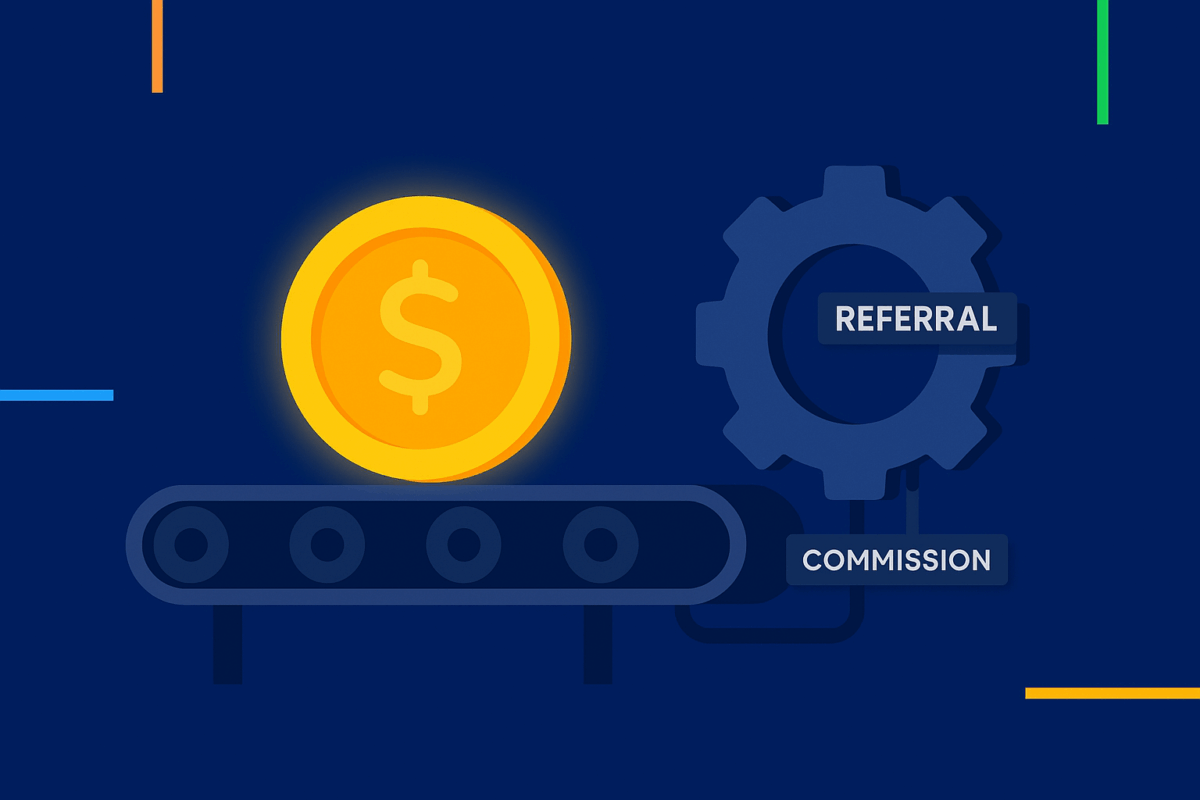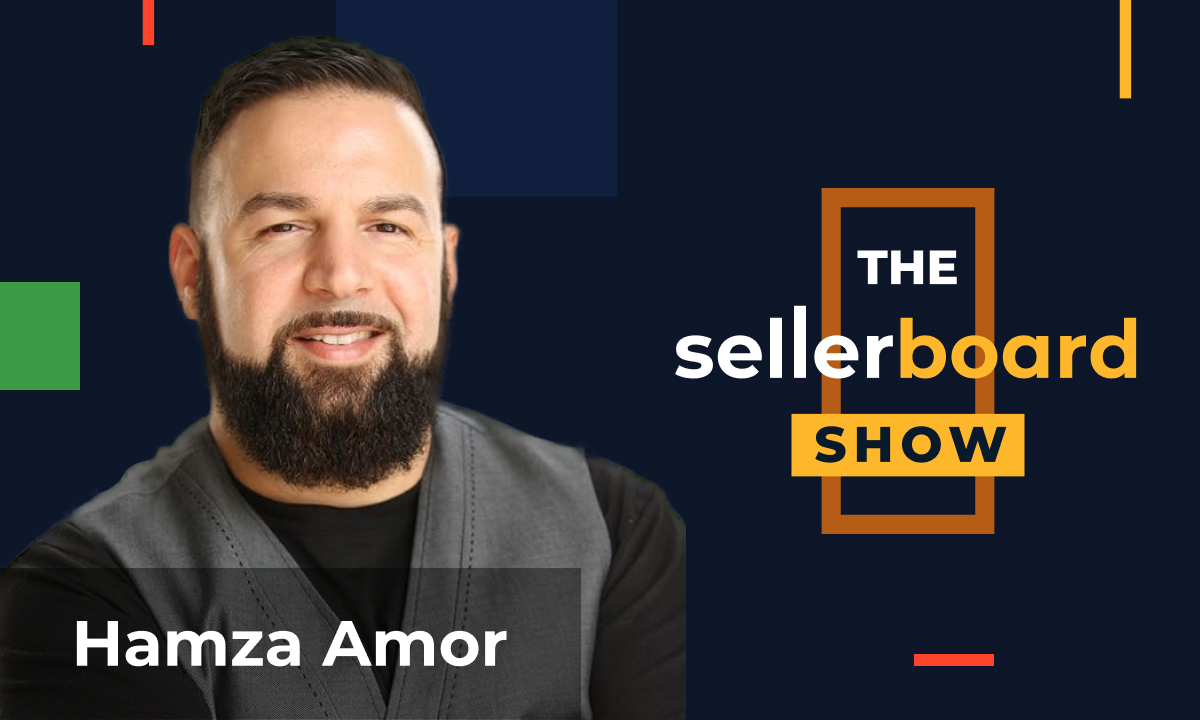Our guest on the sellerboard show was Todd Welch – Amazon wholesale expert, host of the Amazon Seller School podcast.
Contents:
- wholesalers on Amazon;
- how to be the only seller on Amazon listings;
- reverse sourcing;
…and much more!
Watch the full interview by clicking this link.
Speaker1: [00:00:07] Hello, everybody. Welcome. This is your host, Fernando, from sellerboard. Today, I have a very special interview with Todd Welsh. He’s from Amazon Seller School, and he’s going to teach us how does he how he’s working with wholeselling. But before you watch the interview, you have to go to the sellerboard.com right now, click on the demo. We have all the tools that you need to be a successful Amazon seller. Hope you like this interview and I’ll see you guys at the end. Bye bye. Welcome, everybody. This is your host, Fernando from sellerboard and have a very special guest with me today. His name is Todd Welch. Did I get it right?
Speaker2: [00:00:58] Perfect. Exactly right.
Speaker1: [00:01:00] And he’s from Amazon Seller. It’s cool not central Amazon sellers Cool. Thought Thank you so much for being here.
Speaker2: [00:01:11] Absolutely. Fernando. Appreciate you having me.
Speaker1: [00:01:14] I’m so happy you are here. You have like so many things that we want to talk about. But first, let’s start with your story.
Speaker2: [00:01:23] Yeah, absolutely. So originally from Wisconsin, as we were talking about earlier, and somehow we both were have lived in the same town, which is pretty crazy, um, but grew up up in Wisconsin. Now I’m living down here in Tampa, but in between there, you know, went to school for information technologies and really started getting into doing things online, building websites and stuff like that. Um, went down the path of actually building my own computer repair company before starting in my Amazon adventure. But once I sold that computer repair company, I really got into selling on Amazon about the time of 2013, 2014 and 2015. Pardon?
Speaker1: [00:02:22] Early Bird Just start soon.
Speaker2: [00:02:24] Yeah. Yeah. It’s it seems like a long time ago now. But then I talk with people who started in like 2009 and it’s just very envious. I’m like, I wish I could have started back in 2009. Um, but got going in doing retail arbitrage, um, made some money there, lost some money, did some private label brands, had success, but no really major home runs until I found the Amazon wholesale method where I’m selling other people’s products for them on Amazon. And that’s been going really well. We’re on track to do about four and a half to 5 million in sales this year, and we’ve built our team to have about ten people in the Philippines and then five of us here in our warehouse in Tampa.
Speaker1: [00:03:21] Nice, nice. Uh, tell me, tell me more. How how do you do that? How do you do the operations? How do you stumble into that opportunity?
Speaker2: [00:03:33] Sure. So you might remember Scott Volker from the Amazing Seller podcast back in the day. I found his podcast somehow, and that’s kind of how I got started down the rabbit hole of doing private label and some retail arbitrage and stuff like that, which again had varying success in that. And when I was doing the private label and everything, of course, like all of us were watching YouTube videos, listening to podcasts, and somewhere along the line I stumbled on the idea of selling other people’s products on Amazon. And I’m thinking like, Well, that seems like it could be a lot easier, right? Because I’m selling products that I can look on Amazon. I know how well they’re selling. I can go to the brand and say, Hey, sell me those products and I’m going to sell them on Amazon and. It is that simple, but it’s not necessarily completely that easy, right? Because when you’re doing that, you get lots of no’s. No, we don’t want you to sell our products and you get IP complaints, you know, the dreaded copyright violations or trademark violations and stuff, which after you’ve been doing this a while, that’s just kind of a normal thing. It happens to us probably every week. We’re getting some kind of IP complaint. We just submit the proper paperwork and get it removed. But, you know, I went down that rabbit hole and I’ve just gotten really good at selling other people’s products to the point now that we have a lot of clients that are exclusives for us. And so we have an exclusive agreement signed with that brand that we are the only company that can sell their products on Amazon. And that’s been a game changer going down that route. Although a lot of the products that we sell, we don’t have exclusive agreements, a growing amount. We do have exclusive agreements to be the only seller. So we’re not competing with, you know, 20 other guys that are on the list.
Speaker3: [00:05:51] Mhm.
Speaker1: [00:05:51] That’s, that’s a good deal.
Speaker4: [00:05:54] Yes.
Speaker1: [00:05:56] Uh, let me talk about the Amazon seller school. When you do work, when you do start working with that.
Speaker2: [00:06:02] Sure. So the Amazon Seller School is a podcast first and foremost and a YouTube channel where I just jump on there and either talk about how to sell on Amazon myself and the challenges that we’re coming across. Or I interview other people who are specialists in certain areas, maybe PPC like yourself or somebody who’s a specialist in private label or optimizing listings, things like that, and really try to dive in to those topics with them and pull out all the little golden nuggets that can help people do it for themselves as well on their Amazon platforms as they’re building their businesses. And I really started doing that because I got started because of Scott Volker’s podcast. And so I just wanted to kind of give back to the community and hopefully help inspire other people to do the same thing that I’ve done, whether they’re doing Amazon wholesale, private label, retail arbitrage, you know, whatever the case may be. So I started that podcast about three, maybe three and a half years ago, took a hiatus over the last year, year and a half, and now I’m just kickstarting it again. We rebranded from Entrepreneur Adventure and now it’s going to be Amazon Seller School. So if anybody’s looking for a nice podcast, search for it on any of your podcasting platforms, just search for Amazon Seller School and we’ll pop up, subscribe and hopefully we’ll give you some content that’ll be able to help you improve your business and sell more on Amazon.
Speaker1: [00:07:57] Um, and do you have like, um, how’s the podcast? Like, every week?
Speaker2: [00:08:03] Yes, the podcast will be one episode for sure weekly, possibly two episodes, depending on who we have lined up for the week.
Speaker1: [00:08:15] Okay. And what about, uh, like, if you want to if you want to dive into study more how Amazon works. Do you have, like a course something that we can do?
Speaker2: [00:08:28] No course yet. That is something that I have been looking at doing. I’m contemplating starting a membership site where people can pay a monthly fee and we’ll go through building the course together, have weekly Q and A’s and such, but that is still in the planning phases. So if anybody would be interested in that kind of thing, they can go to the Amazon seller.school website, jump on the email list, and then they’ll be the first to know when that does get launched.
Speaker1: [00:09:06] What do you think was what is the best podcast that you did that people should definitely watch?
Speaker2: [00:09:15] Sure. So one of the most liked episodes is probably the reverse sourcing episode, and that’s going to be best to watch on YouTube because it’s visual and essentially it walks you through the exact process that we use to find new products to sell on Amazon. A high level overview. Essentially, you’re going to Amazon finding a product that meets your criteria that you’re like, I would love to sell that. Then you’re jumping over to Google and you’re searching for that brand and distributors for that brand. And once you find those distributors, you’re giving them calls, shooting them, emails to open up accounts and start selling those products. Now, one thing I like to throw out there, one caveat that a lot of people, when they’re doing the reverse sourcing, they find a product and they want to sell that product and they think that they’re going to end up selling that product when in reality, nine times out of ten, you’re probably not going to end up selling that product. But the process of finding that product and finding someone, a distributor of that product is going to find you a ton of other products that you’re able to sell because those distributors, when you open up an account, a distributor could have hundreds or thousands of different brands that they sell. And you’re going to get that list of all those products that then you’re going to be able to match those on Amazon and find products that you can purchase from them and sell.
Speaker1: [00:10:59] Very cool. I like that. Um, tell me about your brands. The brands that you’re working with. Uh, how what do you think? Like, uh, it takes to be successful on that? Uh, you said something that’s very cool. Like you have exclusive, exclusive, exclusive agreement with the company so we don’t compete by the Bible. So that’s one of them.
Speaker2: [00:11:25] For sure. So it’s all a part of the wholesale method. So we’re essentially doing that reverse sourcing that I talked about, finding products to sell. And if we notice that their listings are really horrible, like 90% of the listings on Amazon are just really crappy, right? You know, maybe one blurry photo like a three word title, no bullet points, maybe like Made in China in the description or something like that. If we see those kind of listings and they’re selling well. We’re reaching out to those companies in an effort to bring them on as an exclusive company with us. And if they sign on with an exclusive agreement, we then treat their products as if they’re our own private label products. So we go ahead and we do all the optimization of the copy, create some really nice graphics, make the A+ content, the store for the brand as well. And we do all that free of charge because we’re getting paid for being the exclusive seller of their products on Amazon. So it’s a brilliant, brilliant, good way to get these brands because if they went to a company like, let’s say, my Amazon Guy, which is a fantastic agency, right, they can go there and they pay my Amazon guy thousands of dollars a month to do this for them.
Speaker2: [00:13:01] Or they can come to us and we’ll do it for free. And we just have to be the sole seller of their products on Amazon. So a lot of companies really like that, especially companies that are not Amazon focused. You know, when we’re in this world, we’re talking with all these people that are creating private label products. Everybody’s Amazon first. Most of the world is not like that. There’s thousands, tens of thousands, hundreds of thousands of brands that know almost nothing about Amazon other than maybe that they probably should be on there, but they have no clue how. So before you go down that route, you really want to make sure you are an expert in Amazon or have employees who are experts in those specific areas. So you can really help them. But once you can get to that point, getting those exclusives can be really profitable.
Speaker1: [00:14:05] Daddy is brilliant. I love it. I just love it. Um, let me ask you something. What do you think It’s the biggest mistake that you see sellers doing today?
Speaker2: [00:14:18] Biggest mistake is definitely just giving up too soon. I see it all the time with different sellers, whether they’re and it doesn’t matter which route you’re going. If you’re doing Arbitrage, dropshipping, private label, wholesale, whatever the case may be, a lot of people will start down a path and then something fails. Their product doesn’t sell. Amazon jumps on the listing and they can’t sell it and they got a clearance out of it. And then they’re like, Oh well, that wholesale stuff, that doesn’t work. So I’m going to go over here and try Dropshipping and they really jump around a lot, and that can be really detrimental to getting success because no matter which route you take, no matter what course you buy, no matter what mentor you have, you’re going to run into barriers that make it feel like, well, this is just not going to work. I’m not going to be successful at that. And what a good entrepreneur does is when they run into those barriers, they figure out ways around them or over them or under them to keep going and making their business success. So I think that’s probably the biggest thing that I see people kind of jumping around from one thing to the other. And it’s okay in the beginning because like I said, you know, I tried retail arbitrage, I tried private label, but then I found wholesale and it just felt really good to me. And I went all in, right. And I haven’t looked back and really focused on that. And until you have a successful business and then maybe you can say, okay, maybe I can bring in some private label pieces or something like that, but you really got to stay focused. It’s one of the most important things.
Speaker1: [00:16:10] Got it? Got it. If you were to start right now on Amazon, what piece of advice would you give to yourself? Uh, like, I know this, that would be one of them, but like some other, some other tip of like. Some other thing that you think it’s valuable.
Speaker2: [00:16:31] Sure. So this probably has to do with one of the most boring things of a business, and that is know your numbers. So when I first started out in the retail arbitrage, I had that up to selling about $90,000 a month. I thought I was doing really good, you know, But I didn’t have a bookkeeper or an accountant or anything. I was just kind of keeping track of things on my own. And so I quit. My job, went full time in that, and then the business just collapsed because I could not afford to pay myself enough to maintain my life and also keep running the business. And so because I didn’t know my numbers, I ended up losing about 75 to $80,000 because I had taken some of those Amazon loans and things like that to keep things going. And so that was a hole I had to dig out of. I didn’t give up. I kept going. I got into the wholesale method, dug myself out of that hole, and now I’m doing, you know, like I said, going to do 4.5 million this year, probably. Nice.
Speaker1: [00:17:44] Congratulations.
Speaker2: [00:17:45] So that’s a big thing. Know your numbers. It’s not a sexy thing to do accounting, of course, but if you don’t know if you’re making money. Then nothing else really matters. I could come on here and I keep saying I’m selling 4.5 million. Next month, I could have this business up and selling 20 million. 50 million. As long as I’m okay. Losing money, right? You can sell $100 million if you’re okay. Losing $110 million, that’s easy. So if you’re going to continue long term, though, you got to know your numbers and make sure that you’re profitable. And that comes down to either being really good at QuickBooks and doing that yourself in the beginning. Because, you know, to get a bookkeeper, it’s going to cost you at least a few hundred dollars a month. But as soon as possible, get a bookkeeper who knows what they’re doing with e-commerce. I use a bookkeeper called, um, Accounting. We Will Go is the name of it. And they handle all of our books now for like $550 a month and everything’s in order. Everything’s good. I get my profit and loss statement every month. I get my balance sheet. And if you don’t know what that means, get a basic accounting book for dummies. Because if you’re going to run a business, you need to at least know the high level overview of your numbers to make sure that you’re profitable and you’re going in the right direction.
Speaker1: [00:19:36] Uh, can you speak a little bit about the events in Tampa?
Speaker2: [00:19:41] Yeah, absolutely. So when I moved down here to Tampa a couple of years ago, I got involved in the local Tampa Bay sellers, Amazon Meetup Group, and we have monthly meetings on the first Wednesday of every month and we’ll have some kind of speaker. So, for example, we just last night we had the vice president of sales over at Flippa come down and talk to us about selling our business and how to maximize the value of your business and set your business up for success from the beginning. In the past, we’ve had guys talk on, you know, PPC and building bundles and accounting and lots of awesome topics, which is really great to come and listen to an expert on a specific topic. But to me, what’s even more important is networking with the other sellers. Like I sat down at one of my the first times I went to this meeting and I was just starting to get involved and I was sitting at a table with a few other guys and I’m sitting here talking to this guy about this business that he had started, and I’m giving him tips on how to improve sales and stuff like that and come to find out after a little while later of talking with this guy. This guy is doing $160 million a year on Amazon, the same method in the wholesale method that I’m doing. And so now we’re good friends. You know, we talk every month. We see each other at the meetup. He shares tips with me. I share tips with him. He helped me out with a really good broker to help us get products into Canada and such. So that networking opportunity that happens at those kind of events is by far the the best thing that is a part of it. Nice.
Speaker1: [00:21:47] Very nice. Like, I’m going to have to drive up to Tampa. Um, I’m sure it’s a good time. I was going to ask you something else and just. Just flip my mind. But what was it? I forgot. I totally forgot. So it happens every Wednesday. Once. Once a month. Is there like a special event that will bring more people in?
Speaker2: [00:22:14] So the first Wednesday of every month is when the main meetup is. So that’s where we get most of the people. 30 to 50 people will show up for the speaker, varying levels of people from people who’ve never sold on Amazon. They’re just trying to figure it out all the way up to this guy who does 160 million. He’s a top 100 Amazon seller and everybody in between, you know, five, six, seven, eight figure people. And other than that, we do occasionally like Amazon Coffee Meetups, where we’ll do like a small 5 to 10 person get together, have some coffee talk Amazon we’ve done cigar meetups as well, smoking cigars, talking Amazon, little things like that. But the the first Wednesday meetings are the big ones.
Speaker1: [00:23:10] Nice. Um. Oh, my God. I’m starting to getting worried because I’m forgetting my. My questions. Okay, let’s say you get a wholesale, you get an account from a wholesaler, and this guy is selling all over the place. Target. He’s selling to distributors. And then you start getting hijackers to the listing. People that somehow got a batch of the product and are trying to compete with you for the buy box. What do you have this kind of problem?
Speaker2: [00:23:42] Oh, yeah, yeah. That happens all the time. It’s kind of a normal thing in the wholesale world because we are selling other people’s products and a majority of time these products are sold, sold all over. They might be sold through distributors directly from the brand. They might be sold at Walmart, different retail stores and things like that. So a lot of times you have people jumping on. If you don’t have an exclusive agreement, there’s not a lot you can do on that. You’re just kind of competing with those people. We do try to inform the brand if someone is violating map and stuff like that to try to help them control that a little better. And we also use that as kind of, you know, a nose under the tent to be like, hey, look at all these problems you have having. Maybe we can help you with that if you make us an exclusive. But yeah, that’s a problem all the time. Even when we have an exclusive that is a problem with people jumping on. But when we have the exclusive, we’re also we’re a registered agent for their brand registry so we can initiate those complaints that we talked about earlier and make sure that those people are selling authentic product. And a lot of times when you do those complaints, those people will just send the invoice that they purchased the product and now you know where they buying the product. So then you can talk to the brand and say, here’s the distributor that is selling to Amazon people when they’re not supposed to, and they can either cut them off or talk to them about not doing that and trying to control it that way. Yeah, and that’s very problematic.
Speaker1: [00:25:26] I’ve tried also sending like cease and desist letter to the sellers that are trying to win the buy box and a lot of them just ignore the season desist letter. So yeah so it’s very that’s one of the the the the caveats of for me jumping into wholesalers like or what do I want to have this trouble of competing with buy boxes because it’s like it’s like it you know sometimes they they get the cargo and they’re doing a cheap price and you have no idea how they got it.
Speaker2: [00:26:00] But it can definitely be a problem, which is why we typically try to stick to smaller brands. If I started listing the brands that we sell, the most of you probably will have never heard of them. You know, we’re not selling big brands like Adidas or Apple or something like that, right? We’re selling small, more mom and pop kind of brands. You know, I really love the brands where, you know, you call them up and somebody answers the phone like, hello, you know, business or anything, and you’re like on the phone with the owner because it’s some guy who invented this product and he just sells it out of his house or something, you know?
Speaker1: [00:26:45] Oh, I.
Speaker2: [00:26:46] See. Those are some of my favorite ones to work with. Oh, gotcha. The smaller brands, a lot of times you have less competition and you can also inform them about not selling to other Amazon sellers so that they don’t get their listings overloaded and stuff like that. Even if they don’t want to sign on as an exclusive with you, you can help educate them about how Amazon. Um, but it’s definitely a problem. We got listings that, you know, they’re selling well, and then 100 people jump on, uh, figuratively, literally. It’s not usually a hundred, but maybe 10 or 15 or something like that. And, you know, then you usually just got to sell out and kind of wait for those listings to get better. Again, a lot of times those listings will go like this with the number of sellers, you know, So once the sellers come back down, then you can jump back on, sell it again for a while. But a lot of times those are really good ones as well to try to talk with the brand about either going exclusive with us or at least limiting the number of sellers because what’s going to happen if the brand is allowing all these Amazon sellers, the good sellers like myself, who actually care about representing brands Good. We’re going to just stop selling the product because it’s not worth the pain in the butt. All the.
Speaker1: [00:28:17] Absolutely.
Speaker2: [00:28:19] Crappy sellers who don’t care at all. They’re going to be the ones who just end up selling it. Tanking the price. The listings are going to be horrible. The reviews might suffer and expired. Product can happen a lot and things like that. So we really try to impress upon the brand those kind of things and at least get them to limit the number of sellers that are allowed.
Speaker1: [00:28:48] So can I ask you something? How many how many brands do you have? How many brands are you managing?
Speaker2: [00:28:54] I think right now we have about 100 different suppliers that are in our inventory software. Ones that we consistently order from is probably more around 25 to 30. Actually, I take that back. We’re probably closer to 40 now with various suppliers.
Speaker1: [00:29:18] Do they have to ship to your warehouse and then you do one shipment?
Speaker2: [00:29:23] Most of them, 95% of them are. We have a few of them that are shipping direct to Amazon. But that’s one of our selling points that we try to push as well, is that, hey, instead of, you know, shipping stuff all over the place, just send it to one location and we can handle it for you. You know, for example, if a brand is selling on Amazon themselves, either FBA or but their listings are really crappy, we’ll try to promote, you know, hey, we can make your listings look great and guess what? You don’t have to deal with all the Amazon garbage sending product all over, putting it in bags, putting labels on and all that stuff. Just throw everything on a pallet, send it to us and we’ll do everything for you from there.
Speaker1: [00:30:11] Cool. Very cool. How did you decide on the on the warehouse?
Speaker2: [00:30:17] So a warehouse in the wholesale world is definitely a necessity at some point, in my opinion. You can get away with doing without it, either using a prep center or using your living room or your basement or something, which is how I started and how most people started in wholesale. But eventually you want to probably get a warehouse because the price that you’re paying a prep center is going to be, you know, maybe $1.50 $2 a unit, depending on how much volume you’ve got, where if you have a warehouse and let’s say you’re doing about two, $3 million a year, you can get that cost per unit down, you know, under a dollar for sure. So it’s just one of those things that as you grow, if you want to be truly competitive, you’re going to have to have a warehouse.
Speaker1: [00:31:18] Okay. And did you choose one by price? By location?
Speaker2: [00:31:23] Uh, mostly location just from where we’re at. We found one in the area that worked for us. We’ve got a 5000 square foot warehouse right now.
Speaker1: [00:31:32] Cool. Very nice. Uh, I see you have a medal hanging on your cabinet behind you in the blue ribbon. What is that?
Speaker2: [00:31:41] Have a what?
Speaker1: [00:31:42] A blue thing hanging. Is that a meadow? What is that?
Speaker2: [00:31:47] Oh, that is from the bubble run. It’s just A5K run that I did a few years back. And they were given out the the medals for people who finished it, so. Oh, nice.
Speaker1: [00:32:02] Uh. All right. So what’s next? What’s next for you?
Speaker2: [00:32:07] Sure. So with the wholesale company that I’m building within the next few years, we plan on being at about 10 million plus in sales. And as far as Amazon Seller school, that’s really what I’m kickstarting right now. By the way.
Speaker1: [00:32:24] Guys, if you want to go to his website, it’s Amazon Seller school and you can jump on the site right now.
Speaker2: [00:32:32] Yep. Amazon Seller School and you’ll get to the website. Subscribe to the podcast. We’re going to be relaunching that here shortly and hopefully we’ll be able to pump out some really good content for you to help you grow your business. And if you’d be interested in getting into a membership site where we kind of will hand, hold and walk together in building up an Amazon wholesale business, jump on our email list and you’ll be one of the first to find out about that when that launches.
Speaker1: [00:33:04] Nice. I’m going to sign up right now. Uh, okay. So how do you see yourself in the next five years? Do you see yourself, like, spending more time on the Amazon seller school or on continue growing the warehouse?
Speaker2: [00:33:19] Yeah. So definitely growing the warehouse is the main priority. I’m getting to an area now where I’ve got more employees and so that’s freeing up some of my time from being in the details of the business to working on the business. And Amazon seller school is just going to kind of be a part of that. You know, I enjoy doing that and by doing that, it helps me stay more in tune with everything that’s going on in Amazon because I need to know what’s going on so I can pass it on to people on the podcast. So it just helps me with the learning and it also really connects me with people that you might not connect with otherwise. Like I was saying, with the Meetup group, I’m meeting all those people when I’m interviewing some kind of specialist on the podcast, you’re making that face to face connection and when you share an hour with someone like we are now, now we’ve got more of a connection, right? I’m just not a name that’s out there or a random person, you know, if I need something from Fernando, I can shoot you a message. You know who I am. We’ve got a little bit of a connection, and it really can help grow your network that way.
Speaker1: [00:34:37] Yeah, that’s very smart. I like that. Uh, okay. Uh, tips for people that are interested in jumping in the same path that you took. Well, can you give us like three tips if you’re like if you’re thinking about switching from private label a little bit and going to the wholesale wholesale business, give can you give us three tips to start?
Speaker2: [00:35:04] Yeah, sure. So, you know, the first tip would be if you’ve never sold anything on Amazon. I would recommend doing some very basic retail arbitrage to start. Go to the Walmart clearance aisle. Scan a few things with the Amazon seller app and find a few things that you can sell on Amazon. Even if you’re not going to make any money off of it because the point is not to make any money. The point is to learn. How to take that product and physically get it into Amazon’s warehouse and how that process works, because you’re going to need to know how to do that. And if you can do that by going and spending 20 bucks at Walmart and sending those products in, you’re going to learn way.
Speaker1: [00:35:52] Cheaper than buying 500 units on Alibaba.
Speaker2: [00:35:55] Exactly. But it’s the exact same process that you’re going to do with $20 worth of product or $20,000 worth of product. So learn that product process. So that probably be the first step. But then getting into wholesale. Um, look at my reverse sourcing video. So if you search reverse sourcing and the podcast used to be called Entrepreneur Adventure.
Speaker1: [00:36:25] Oh, I see. I see the Blake over there. Entrepreneur Adventure.
Speaker2: [00:36:30] Um, but I changed it to Amazon Seller school because it’s a little more specific as to what we’re actually doing. And a lot of people have trouble spelling. Entrepreneur So the tough thing for some people but search for reverse sourcing entrepreneur adventure and that’ll come up. Watch that video that’ll tell you exactly how to find products. And then the third tip is be very patient because in the Amazon wholesale world, you’re going to get a lot of people that say, No, no, we don’t want you to sell our products. And that’s just something that’s going to happen. And every node just gets you closer to the Yes. If you’re trying to buy directly from a brand, you’re going to get like 80, 90% no’s. If you’re buying from distributors nowadays, you’re probably going to get like 30 to 40% no’s on that.
Speaker1: [00:37:24] So just be aware that if if you’re buying from just distributors, the chance of fighting for the buy box is going to be bigger.
Speaker2: [00:37:33] It definitely is. It’s not guaranteed, but it’s definitely more likely because if you were able to get access to that product, other people are going to as well. And kind of a fourth bonus tip don’t always take no for an answer when they say no to you. Opening up an account especially direct with the brand, there’s usually a reason behind that, and it’s really simple. Usually to find out all you have to do when they say, No, we don’t want any more Amazon sellers, Just say, Do you mind if I ask why you’re not taking any more Amazon sellers? And the key part of that is, do you mind if I ask? Because that way you’re not saying, Well, why aren’t you taking any more Amazon sellers, which can come off as combative? Instead, you’re asking if you can ask a question which is very passive, very non combative, but 99% of the time they just answer the question that you wanted to ask them, right?
Speaker1: [00:38:39] So ask you if could be on your podcast. Pardon? Can I ask you if I could be on your podcast?
Speaker2: [00:38:48] Yes. Yes, exactly. I ask you if I could be on your podcast. And of course, I’m just going to come back and answer your question. Yeah, you can be on the podcast or no, you can’t be on the podcast, whatever the case may be. But what they answer to that is they’re going to tell you their problem and then it’s your job to solve their problem. They might say, Oh, we’ve got like 50 people on our listings and we don’t know who the heck any of them are. And then that’s your cue to be like, Hey, maybe make us an exclusive. And then you don’t have to deal with all those sellers. We can help you get rid of them. We know how to do that and just go down that rabbit hole and try to solve their problems. Sometimes it works. A lot of times it doesn’t. But it’s all a numbers game.
Speaker1: [00:39:38] Very cool. I love it. Um, are you the. The sole owner of the of of your business or do you have a partner?
Speaker5: [00:39:47] I am.
Speaker2: [00:39:48] I’m the the sole owner officially, but without my wife, I probably couldn’t have done it. So essentially, she’s a 5050 partner.
Speaker1: [00:39:58] Nice. Very cool. Um, okay, so what is the last message that you want to give to our viewers today?
Speaker2: [00:40:07] Sure, I guess, you know, just find what you want to do and move forward with it. There’s nothing that’s easy. There’s no such thing as passive income. There’s no such thing as those guys that say they’re going to build you an Amazon business and you don’t have to do anything. All that stuff is garbage. When you’re building an Amazon business, you’re building a real business. So treat it as if you were building a real business, opening up a retail shop or something like that, and that will put you in the right mindset to be a lot more successful.
Speaker3: [00:40:46] Nice.
Speaker1: [00:40:47] And for those who want to contact you. How do they find you?
Speaker2: [00:40:52] Just go to Amazon seller.school and you can either click on contact there to email me or click on Ask Todd and you can record me a voice message there that a lot of times I will answer those questions on the podcast.
Speaker1: [00:41:08] Nice. Very cool. Okay, so, um, but thank you so much for being here. Uh, don’t hang up. I’m going to be right with you. And for our our viewers from this episode, thank you so much for your time. Thank you so much for your patience. Uh, if you if you the first time here, please go to YouTube. Subscribe, click the bell to receive notifications and watch the other episodes. We have very interesting episodes and I’ll talk to you guys later. So final, final words for our viewers.
Speaker2: [00:41:43] Yeah. I appreciate you having me, Fernando. Having me on the podcast and look forward to hoping, being able to help some of the viewers out there through the Amazon Seller school. Or maybe I’ll see you at one of the Tampa Bay seller meetups.
Speaker1: [00:42:00] Nice. Thank you so much. I’ll see you guys all all of you guys in the next episode. Bye bye. And that was our interview with Todd Welch from Amazon Sellers School. I hope you liked it. So it’s not only private label, we also have opportunities on wholesale. So and before you hang out, just just remember have to go to sellerboard.com and test it out. Do you have a demo? You can click on the demo and play around with the software. We have every single tool you need to be a successful Amazon seller. I’ll see you guys in the next video. Bye bye.
